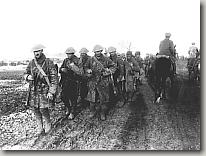|
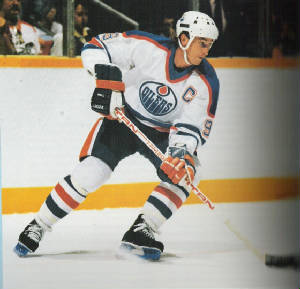
NHL records
Wayne Gretzky held or shared 61 NHL records upon his retirement on April 18, 1999, including 40 regular season records, 15 playoff records, and 6 all-star records.
The regular season records include most goals in a season (92), most assists in a season (163), and most points
in a season (215). He also holds the record for the fastest 50 goals, accomplishing that feat in only 39 games and the record for most goals in a 50 game period (61, which he accomplished twice).
In 1983-84, he had a 51-game point-scoring streak that has been compared to "Joltin' Joe" DiMaggio's streak in baseball, during which he scored 61 goals and received credit for 92 assists (153 points).
Gretzky set impressive records in both regular season and post-season play, holding the record for most career
regular season goals (894), assists (1,963), points (2,857), and hat tricks (50). The next closest player in total points for the regular season is Mark Messier at 1,887. Gretzky's point total including regular season and playoffs stands at an imposing 3,239. Gretzky also had more
career assists than any other player has ever gained total points.
His 47 playoff points in 1985 and 31 assists in 1988 are still records for a single post-season round, and he
holds the record for career playoff goals (122), assists (260), points (382), hat tricks (10), and game winning goals (24).
More....
Wayne Douglas Gretzky, (born January 26, 1961) is a retired Canadian professional ice hockey player who is currently part-owner and head coach of the Phoenix Coyotes. Born in Brantford, Ontario and nicknamed "The Great One," Total Hockey: The Official Encyclopedia of the NHL calls Gretzky "the greatest
player of all time". He is generally regarded as the best player of his era and has
been called "the greatest hockey player ever" by many sportswriters, players, coaches, and fans. Along with his many awards and achievements, he is the only player to ever
have his playing number, 99, officially retired across the entire National Hockey League.
Identified as a hockey prodigy at a very young age, Gretzky regularly played at a level far above his peers. He became a full professional at the age of 17 in the World Hockey Association, leading to a long career in the NHL. He set 40 regular-season records, 15 playoff records, 6 All-Star records, won four Stanley Cups with the Edmonton Oilers, and won 9 MVP awards and 10 scoring titles. He is the only player ever to total over 200 points in a season (a feat that he accomplished four times in his career). In addition, he tallied over 100 points a season for
15 NHL seasons, 13 of them consecutively.
He retired from playing in 1999, becoming Executive Director for the Canadian national men's hockey team during the 2002 Winter Olympics. He also became part owner of the Phoenix Coyotes in 2000 and following the 2004-05 NHL lockout became their head coach.
|
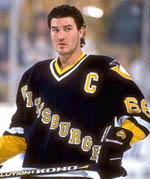
Mario Lemieux
(born October 5, 1965, in Montreal, Quebec, Canada) is a retired professional ice hockey centre who played 17 seasons for the Pittsburgh Penguins of the National Hockey League between 1984 and 2006. He is also the Penguins' principal owner and chairman of the board, having bought the team out of bankruptcy in 1999.
Lemieux is generally regarded as one of the greatest players to ever play in the NHL. Despite a Spinal disc herniation, Hodgkin's lymphoma, chronic tendinitis of a hip-flexor muscle,[1] and an atrial fibrillation, he was a three-time MVP, led the league in scoring six times, and was the playoff MVP both times in his team's two consecutive Stanley Cup championships.His agent suggested he wear 66 since the media was calling him the next Gretzky.
The number 66 is the upside down version of Gretzy's #99.
More...
NHL Records
- NHL single-season record for shorthanded goals (13 in 1988-89)
- NHL record for most goals in one period (4, 26 January 1997, shares record)
- NHL record for longest goal-scoring streak (12 games)
- NHL record only player in history who scored over 30 Power-Play-Goals in two different seasons
- NHL record only player in history who scored over 10 Short-Handed-Goals in two different seasons
- NHL All-Star Game record for career goals (13, shares record)
- NHL All-Star Game record for goals in a single-game (4 in 1990, shares record)
- NHL All-Star Game record for points in a single-game (6 in 1988)
- NHL All-Star Game record for most MVP-Awards (3, shares record with Wayne Gretzky)
- NHL playoff record for goals in a single period (4, shares record)
- NHL playoff record for goals in a single game (5, shares record)
- NHL playoff record for points in a single period (4, shares record)
- Pittsburgh Penguins team record for career games played (915)
- Pittsburgh Penguins team record for career goals (690)
- Pittsburgh Penguins team record for career assists (1033)
- Pittsburgh Penguins team record for career points (1723)
- Pittsburgh Penguins single-season record for goals (85 in 1988-89)
- Pittsburgh Penguins single-season record for assists (114 in 1988-89)
- Pittsburgh Penguins single-season record for points (199 in 1988-89)
- Pittsburgh Penguins single-game record for goals (5, three occasions)
- Shares Pittsburgh Penguins single-game record for assists (6, three occasions)
- Pittsburgh Penguins single-game record for points (8, two occasions)
- Only player in NHL history to score a goal in each of the five different ways possible in one game (even-strength,
power-play, shorthanded, penalty shot, and empty-net) (December 31, 1988 against the New Jersey Devils)
|
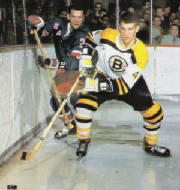
Robert Gordon "Bobby" Orr,
(born March 20, 1948 in Parry Sound, Ontario) is a retired Canadian ice hockey defenceman, and is considered to be one of the greatest hockey players of all time.[1][2] He played for the NHL teams Boston Bruins and Chicago Blackhawks.
Born in Parry Sound, Ontario, Canada, Orr displayed his ice hockey talents at a very early age. He started skating and playing Shinny at age four, and was signed by Boston Bruins' scout Wren Blair at the age of twelve. As a 14-year-old he played for the Oshawa Generals in the junior league Ontario Hockey Association, competing against eighteen-, nineteen- and twenty-year-olds; National Hockey League rules dictated that he could not join the Boston Bruins before reaching eighteen. In his third season Orr led the Generals to the OHA championship, and in his final
season with Oshawa he averaged two points a game. Prominent Toronto lawyer Alan Eagleson negotiated his first contract with the Bruins. At the time it made Orr the highest-paid player in league history.
In his first professional season — although missing nine games with a knee injury presaging such woes throughout his career — he
won the Calder Memorial Trophy as the league's outstanding rookie and, while the perennially cellar-dwelling Bruins finished in last place
that season, sparked a renaissance that propelled the Bruins to make the playoffs the following twenty-nine straight seasons.
New York Rangers defenceman Harry Howell, the winner of the Norris Trophy as the league's best defenceman in Orr's rookie year, famously predicted that he was glad to win when he did,
because "Orr will own this trophy from now on."
Records
- Most points in one NHL season by a defenceman (139; 1970–71).
- Most assists in one NHL season by a defenceman (102; 1970–71).
- Highest plus/minus in one NHL season (+124; 1970-71).
- Tied for most assists in one NHL game by a defenceman (6; tied with Babe Pratt, Pat Stapleton, Ron Stackhouse, Paul Coffey and Gary Suter).
- Held record for most assists in one NHL season from 1971 to 1981 (102; broken by Wayne Gretzky and also bettered by Mario Lemieux), this is still a record for a defenceman.
- Held record for most goals in one NHL season by a defenceman from 1971 to 1986 (37 in 1971, broke own record
in 1975 with 46; broken in 1986 by Paul Coffey with 48).
|
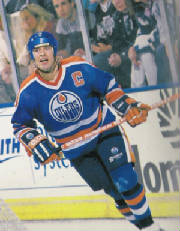
How To Survive Financially As A Stay At Home Mome
Click Here
|
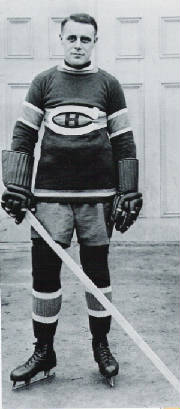
"Phantom" Joe Malone.
Born in Quebec City. (Feb 28, 1890 - May 15, 1969)
Holds record for most goals (7) in 1 game.
Malone broke in at the age of nineteen for the Quebec Bulldogs of the Eastern Canada Hockey Association in the 1909 season, scoring eight goals in twelve games. The next season the NHA formed, but Quebec was left
out of the loop, so he played for Waterloo in the Ontario Professional Hockey League. Rejoining Quebec in 1911, he was named the team captain and so served for the Bulldogs' seven NHA seasons.
Centering linemates such as Eddie Oatman and Tommy Marks, he led the Bulldogs to the Stanley Cups in 1912 and 1913 -- rampaging for a career best nine goals in a Cup match against Sydney -- while recording
remarkable scoring marks of 43 goals in twenty games in 1913 and 41 goals in 19 games in 1917.
When the NHL was founded in 1975, Quebec did not operate a team its first season,
so Malone joined the Montreal Canadiens. Playing on what was one of the most powerful forward lines of all time with Newsy Lalonde and Didier Pitre, Malone shifted to left wing to accommodate the great Lalonde, and was the NHL's first scoring leader, registering
44 goals in twenty games, a record total that would stand as the NHL's single season goal scoring mark until 1945
and a record per-game average that stands to this day. (If such an average was sustained over today's 82-game schedule,
it would result in 180 goals. Malone scored at least one goal (and a total of 35 goals) in his first 14 NHL games to set the
record for the longest goal-scoring streak to begin an NHL career. This streak
still stands as the second-longest goal-scoring streak in NHL history.
|
